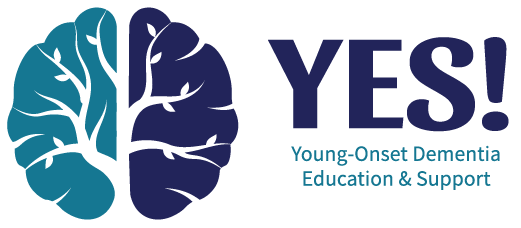A diagnosis of Young-Onset Dementia (YOD) is a journey that starts well before diagnosis. This is a collection of information the aim of which is to help others move through their own unique journeys with this diagnosis. It is based on the experience of the YES! Board who have either lived through this experience, are experts in their field, or both. First, it is important to understand what Alzheimer’s is and what it looks like.
For a list of resources and support specific to a younger audience, see our Young Adult and Teen Resources page.
What is Alzheimer’s?
Resource Links
These are some of the leading sources of information on dementia and Alzheimer’s:
Area Aging Services
National Institute on Aging (NIH)
USAgainstAlzheimers
Clinical Trials
National Academy of Elder Law Attorneys
Family Caregiver Alliance
Alzheimer’s Association
Alzheimer’s Foundation of America
Lewy Body Dementia Association
The Association for Frontotemporal Degeneration
Bright Focus Foundation
National Caregiving Foundation
On the Overview of Dementia page, read about early signs, symptoms, and progression of the disease.
Getting a Diagnosis
Getting a diagnosis can be surprisingly difficult. In part due to family physicians being underinformed about the complex ways dementia can present, and also due to the fact that early symptoms of dementia are also symptoms of other illnesses like depression or anxiety.
Knowing what to tell the doctor when going to an appointment is key to getting the right diagnosis. YES! has compiled a resource for physicians which is just as much a resource for the loved one going to the appointment.
When you become a caregiver, it can take up your whole life. Many people have gone through the same thing as you. Reach out and contact YES! to find a support group, and look at the resources for caregivers that members of YES! compiled.
When the Diagnosis is Made
Legal
Advanced directive, power of attorney, last will and testament
Medicaid & Disability
What is Medicaid? What is the eligibility criteria?
Financial
Long term care, social security/disability, asset management
Finding Care
There are several different options for care for a loved one, and the best choice for you is a very personal decision, based on many different factors. Below are resource pages that will help you interview and find the right caregiving option. Thank you to Absolute Companion Care for the documents.
An article explaining different levels of care, overview of care options and when to pursue care for a loved one.
Questions to ask a care facility
Questions to ask a residential services agency
Questions to ask a private care provider
End of Life
End of life stage comes with many difficult decisions and emotions. One that may come as a surprise is anticipatory grief. This may start well before the end of life stage, and is just as impactful as grief for someone who has already died. See the anticipatory grief page for more information.
Near the end stages of a dementia patient’s life, there will be difficult choices that have to be made. YES! has a page that seeks to help distinguish between palliative care and hospice so that you can make an informed decision for your oved one.

